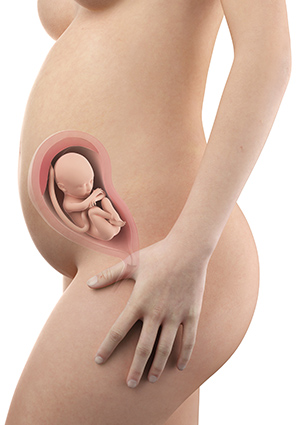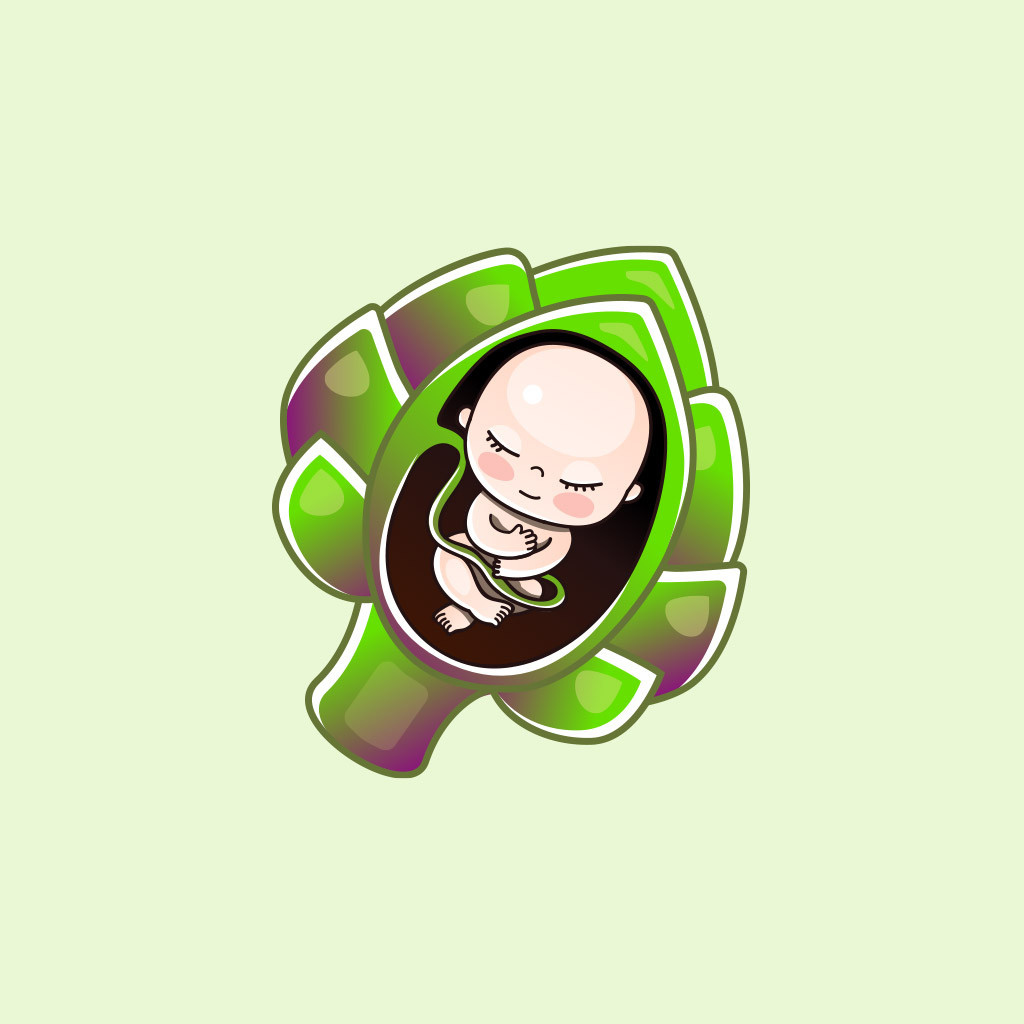Congratulations on reaching week 24! If you place your hand on your belly, you might notice just how much it’s grown — and it’s no wonder. Your baby is now about the size of an ear of corn, and their tiny body is filling out, getting plumper and stronger each day.
Around this time, many moms find themselves feeling a mix of excitement and anticipation. Your baby is busy practicing movements, and you might notice more regular kicks, swishes, and stretches throughout the day. These little flutters can be comforting, reminding you of the wonderful progress you and your baby are making together.
Week 24 is also an important milestone in your pregnancy. Your little one’s organs are developing rapidly. Their lungs are growing branches of the respiratory “tree,” and their skin, once nearly transparent, is starting to look a bit more opaque. Inside the womb, your baby is practicing breathing motions, and their face is fully formed — even eyelashes and eyebrows are appearing!

For you, there may be some new changes as well. As your uterus continues to expand, you might notice mild aches in your lower abdomen or back. It’s also not unusual to feel some swelling, especially in your feet and ankles. Rest when you can, prop up your legs, and remember to drink plenty of fluids. Most of these symptoms are perfectly normal as your body keeps supporting your growing baby.
- If you haven’t already: This is a great time to start thinking about your birth plan and discussing any questions with your healthcare provider.
- Glucose screening: Many providers schedule a test for gestational diabetes between now and week 28. Feel free to ask your doctor about when and how this will take place.
- Baby’s movements: Noticing patterns in your baby’s activity is helpful, but don’t worry if some days feel busier than others. Every pregnancy is unique.
As you continue through your second trimester, remember: you are doing an amazing job. Take time each day to rest, bond with your baby, and take care of yourself. If you have any questions or worries, reach out to your healthcare provider—they are there to support you every step of the way.
Your Baby’s Development This Week
Welcome to week 24 — you are officially about six months along, and your baby is making some amazing progress! This is a time when some of the most exciting growth and changes happen, both for your little one and for you.
Right now, your baby is about the size of a cantaloupe — around 12 inches from head to heel and weighing just over a pound. They’re really starting to look more like a newborn, although there’s still lots of growing to do before their big debut.
- Unique Traits Take Shape: This week, your baby’s fingerprints and toe prints are settling in. These unique patterns form as a combination of their genes and gentle movements in the cozy world of your uterus. Your baby’s individuality, down to their fingerprints, is truly their own!
- Responsive and Aware: Inside your belly, your baby’s senses are springing to life. Their ears are now fine-tuned enough to pick up sounds outside your belly, so don’t be surprised if your little one responds with a kick or gentle wiggle to music or your voice. If you talk, sing, or gently press on your bump, your baby just might “answer” in their own special way.
- Muscle Power and Movement: The muscles in your baby’s arms and legs are getting stronger every day. You may notice more frequent or pronounced flutters and kicks, especially when you’re relaxing. Every little movement your baby makes is a positive sign that they’re getting more coordinated and active.
- Skin Changes and Fat Building: At this stage, your baby’s skin is still somewhat see-through and wrinkled, but underneath, they’re starting to lay down more fat. This fat works as an energy store and will eventually help regulate their body temperature once they’re born. As more fat builds, their skin will slowly turn less transparent and more rosy.
- Growing Hair and Lashes: Tiny hair follicles are busy growing this week. While your baby might already have eyebrows, eyelashes, and even some hair atop their head, pigments that give color to the hair may not have settled in yet—so even if your family has dark hair, don’t be surprised if your baby sports soft, light fuzz at birth.
- Lungs Maturing: Although your baby’s lungs have formed their basic structure, they’re not quite ready for the outside world. Specialized cells are starting to make surfactant, a substance that helps the lungs expand after birth, but your little one would still need help to breathe if born now.
Every mother and baby grow at their own unique pace, so try not to compare your journey with anyone else’s. It’s not uncommon to notice more pronounced fetal movement, and familiar faces may start to recognize your beautiful baby bump.
This can be a special time to bond — talking, singing, and gentle belly rubs all help nurture your connection.
As your baby keeps developing week by week, remember that your support, healthy choices, and daily care help pave the way for their earliest milestones — both before and after birth. Keep enjoying this journey, and don’t hesitate to reach out to your care provider with any new questions or experiences!
Changes in the Mother’s Body
Reaching week 24 is a major milestone—your pregnancy is well past the halfway point, and your body is working hard to nurture your growing baby. Many mothers notice big changes at this stage, both physically and emotionally. Here’s what you might be experiencing and some tips to help you feel your best.
Your Growing Belly and Body
By week 24, your uterus has expanded quite a lot, making your baby bump more pronounced. You might notice the top of your belly is close to your belly button or even above it. As your belly grows, you could find it a little harder to bend over, sit comfortably, or find a good sleeping position. Now is a great time to try out pregnancy pillows, loose clothing, and shoes that are easy to slip on and off.
- Backache: As your center of gravity shifts, lower back pain is common. Gentle stretches, warm compresses, and good posture can make a big difference. Try to avoid lifting heavy objects and wear supportive shoes.
- Leg Cramps: Many women get sudden cramps, especially at night. Stretching your calves before bed and staying well-hydrated can help ease these cramps. Flex your feet before lying down to keep muscles relaxed.
- Swelling: Feet and ankles may swell as your body holds onto more fluid. Rest with your legs up when you can and avoid standing for long periods. Comfortable shoes are your friend!
- Skin Changes: Around this time, some women notice faint red or purple lines on their belly, hips, or breasts—these are stretch marks, a normal sign of skin stretching. Moisturizers can soothe itchiness, but remember, genetics play a role in stretch marks.
- Breast Growth: Your breasts may grow fuller and feel heavier as they prepare for feeding your baby. A comfortable, supportive bra can help you feel more at ease.
- Changing Skin Color: It’s not uncommon to see darker patches of skin, especially on your face (sometimes called the “mask of pregnancy”), or a dark line running down your belly (the linea nigra). These changes tend to fade after delivery.
Baby’s Presence Is Felt
By now, you’re likely to feel more regular kicks, rolls, or stretches from your little one. Every mother’s experience is unique, but paying attention to these movements is a lovely way to connect with your baby. Dad may be able to feel or hear gentle baby movements or the baby’s heartbeat by placing an ear to your abdomen, which can be a special bonding moment.
Emotional Well-being
Alongside physical changes, you may notice your emotions fluctuate. Hormones, anticipation, and the reality of impending motherhood can bring both excitement and anxiety. It’s perfectly normal to have mixed feelings. Make time for activities you enjoy, talk openly with your partner or friends, and don’t hesitate to ask for support when you need it.
Tips for Coping with Changes
- Stay active with gentle exercise like walking, prenatal yoga, or swimming, as approved by your healthcare provider.
- Stay hydrated, and eat a balanced diet to keep your energy up and support your growing baby.
- Keep up with regular prenatal visits, where your doctor can address new symptoms and help you navigate this exciting stage.
- Prioritize rest whenever possible—it’s normal to feel more fatigued as your body’s workload increases.
Remember, every mother and pregnancy is different. If you notice anything unusual—such as severe pain, sudden swelling in the face and hands, or decreased baby movements—reach out to your healthcare provider for advice. You’re doing a wonderful job supporting your baby, and taking care of yourself truly matters!
What Medical Checkups & Screenings to Expect at Week 24
Now that you’ve reached 24 weeks, there are a few important checkups and health screenings you’ll want to know about. These visits help make sure both you and your baby are staying healthy as you move closer to your third trimester. Even if you’re feeling well, these routine appointments are an essential way to track your pregnancy’s progress.
- Glucose Screening for Gestational Diabetes One of the key tests around this time is the gestational diabetes screening. At your appointment, your provider will usually ask you to drink a sugary liquid. About an hour later, they’ll check your blood sugar with a quick blood draw. This test helps see how your body is handling sugar and checks for a type of diabetes that sometimes appears during pregnancy. If your levels are higher than expected, you might need a repeat test on another day, but many people pass on the first try.
- Tracking Your Baby’s Growth Your doctor or midwife will measure the size of your belly from your pubic bone to the top of your uterus. This measurement—called the fundal height—gives a general idea of your baby’s growth. It often matches the number of weeks you’ve been pregnant, give or take a couple of centimeters.
- Checking Your Health Regular checks of your weight and blood pressure help ensure you and baby are staying healthy. Your provider will also collect a urine sample at most visits. This quick check looks for early signs of preeclampsia—a condition linked to high blood pressure—as well as signs of infection or other issues.
- Listening to Baby’s Heartbeat This is a special part of your visit! Your provider will use a small handheld device (called a Doppler) to let you listen to your baby’s heartbeat for a few moments. Many parents find this the highlight of their appointments.
- Open Time for Questions and Concerns These checkups are also the perfect time to mention any new symptoms, worries, or changes you’ve noticed. Whether it’s leg cramps, trouble sleeping, swelling, or something you’re just curious about, bring up anything on your mind. No question is too small.
At this stage, your checkups are about so much more than just numbers on a chart. They give you peace of mind and allow your provider to catch any potential problems early, before they become bigger issues. Remember, your care team is there to support you every step of the way—never hesitate to reach out between visits if something doesn’t feel quite right.
Nutritional Tips and Physical Exercise
Week 24 is a wonderful milestone! Now that you’re more than halfway through your pregnancy, taking care of your nutrition and staying active can make a big difference in how you feel each day. These tips can help you nourish your body (and your growing baby), boost your energy, and make these middle months of pregnancy more comfortable and rewarding.
- Find colorful variety in your meals. Try to fill your plate with all the colors of the rainbow. Orange carrots, leafy greens, red bell peppers, fresh berries, and yellow squash all pack in different vitamins and minerals. Even simple snacks like apple slices with peanut butter or a mix of cherry tomatoes and cheese cubes can offer nutrients your body really needs right now.
- Include iron-rich foods every day. Your blood volume is climbing to meet your baby’s needs, so iron is especially important in your second trimester. Great sources include lean red meat, poultry, beans, spinach, and fortified cereals. Pairing these with a glass of orange juice or a few strawberries helps your body soak up the iron even better.
- Don’t forget small, frequent meals. As your baby grows and your stomach gets a little more crowded, eating five or six smaller meals can help you feel comfortable and keep your energy steady. This can also ease heartburn and nausea for some moms.
- Snack smart for bone strength. Your little one is busy building strong bones, so calcium remains a big priority. Between meals, reach for yogurt with fruit, a handful of almonds, or a few cheese slices to help meet your calcium needs.
- Flavorful hydration counts, too. If plain water is getting a bit boring, add a splash of lemon or a few cucumber slices. Herbal teas (like ginger or peppermint) and broths can also help keep your fluids up — just check with your provider about safe options for you.
- Listen to your hunger and fullness cues. It’s easy to focus on “eating for two,” but your body knows best! Tune in to your true appetite and stop when you feel satisfied, not stuffed.
- Stay gently active, safely. Walking, swimming, or prenatal yoga can keep your body flexible, support circulation, and help with sleep. Many expectant mothers enjoy 20–30 minutes of movement most days — just go slow, and stop to rest if you get tired or short of breath.
- Simple stretches matter. As your belly grows, gentle stretching of your back, hips, and legs can relieve tightness and set you up for better sleep at night. Try rotating your ankles and flexing your calves if you experience leg cramps.
- Safe strengthening exercises. Light weight-bearing (like using soup cans for arm curls, or practicing gentle squats near a chair for support) can strengthen muscles you’ll rely on during birth and recovery. Focus on posture: shoulder rolls and standing tall help prevent backaches.
- Include your partner or a friend. It’s more fun and motivating to get moving together! Invite your partner for an after-dinner stroll, or join a prenatal class in your community — you might meet other moms-to-be and share encouragement.
If your provider has given you any special guidance or if you notice anything unusual — like pain, spotting, dizziness, or leaking fluid — pause your exercise and reach out right away. Otherwise, remember that well-balanced nutrition and gentle physical activity are some of the best gifts you can give yourself and your developing baby at this stage. You’re doing great!
Weekly Checklist
This week brings exciting changes for both you and your baby! Here are some simple but important things you can do to support a healthy pregnancy and help you feel your best as you reach 24 weeks.
- Schedule and prepare for your gestational diabetes screening. Most doctors recommend this test right around 24 weeks, so check your appointment schedule. Ask your provider what to expect and if you should change anything about your meals that day.
- Track your baby’s movements. You may notice baby’s kicks and rolls are becoming regular. Pay attention to these patterns and mention any big changes at your next visit.
- Focus on your feet. Swelling is common at this stage. Rest with your feet up when you can, try gentle stretches, and wear comfy shoes that give your toes plenty of space.
- Support your back and posture. As your belly grows, backaches are normal. Try using a supportive pillow while sleeping or sitting, and stand up straight to help ease discomfort.
- Keep eating balanced, colorful meals. Continue to include iron-rich foods like spinach and lentils, calcium sources like yogurt and cheese, and vitamin D from safe sun exposure or supplements, as discussed with your provider.
- Stay hydrated. Aim to sip water throughout the day. Carry a water bottle as a reminder—your body needs extra fluids now for both you and your growing baby.
- Moisturize your skin daily. As your belly and breasts stretch, using a gentle moisturizer can help with itchiness and keep your skin comfortable.
- Monitor weight gain the healthy way. Check in with your provider about your progress and don’t stress over the numbers—every pregnancy is unique, and your care team is there to guide you.
- Take time to rest and recharge. Good sleep may be harder now, so find moments during the day to relax, whether it’s a short nap or simply putting your feet up with a book.
- Connect with your baby and partner. Place a hand (or let your partner listen!) to your belly and enjoy these special moments as your baby gets stronger and more responsive each day.
When to Call Your Provider
Every pregnancy is unique, and sometimes figuring out what’s normal or not can make you feel a little on edge—especially around week 24, when change is happening fast. Most symptoms are just a sign your body is working hard, but there are certain changes you shouldn’t ignore. If you notice any of the following, reach out to your healthcare provider sooner rather than later. It’s always better to ask and feel reassured than to worry alone.
- Bleeding or Leaking Fluid: If you notice any vaginal bleeding, or if it feels like you’re leaking watery fluid (which could be amniotic fluid), call your pregnancy care team right away. This could signal early labor or another concern affecting you or your baby.
- Strong Cramps or Lower Belly Pain: Occasional mild aches happen as your uterus grows, but if pain becomes sharp, persistent, or comes with pressure low in your pelvis, it’s important to get checked out.
- Sustained Contractions: Before week 37, any regular tightening or hardening of your belly that happens more than four times in one hour could be a sign of preterm labor. Contact your provider if this happens—even if the contractions aren’t painful.
- Fewer Baby Movements: Most women start feeling their baby’s movements more clearly around this time. If you notice your baby’s kicks or rolls aren’t happening as often as usual, or if you’re worried the baby seems less active, don’t hesitate to call.
- Severe Swelling: While some swelling in your feet and ankles is to be expected, sudden, severe swelling in your face, hands, or around your eyes may mean something more serious, like high blood pressure or preeclampsia.
- Severe Headaches, Vision Changes, or Dizziness: Watch for headaches that don’t go away even after resting, blurry vision, seeing spots or flashing lights, or episodes of feeling faint—all of which are important to bring up quickly.
- Burning or Pain While Peeing: If it hurts or burns when you urinate, or you notice blood in your urine, you could have a urinary tract infection, which is important to treat during pregnancy.
- High Fever or Persistent Cough: Running a temperature above 100.4°F (38°C) with chills, or an ongoing cough, should always be checked. Illness can affect you and your baby, so your provider will want to make sure you stay well.
- Feeling Very Short of Breath or Chest Pain: Some breathlessness is common as your body changes, but if you’re struggling to breathe, can’t catch your breath even at rest, or you feel chest pain or pressure, get medical help immediately.
- Sudden, Severe Upper Body Pain: Pain that comes on suddenly in your upper belly or under your ribs may be a sign of a problem and should be discussed with your provider.
If anything feels “off” or you’re just not sure whether what you’re experiencing is okay, remember that your care team is always there to support you. No concern is ever too small when it comes to your health and your baby’s well-being. Trust your instincts and reach out whenever you need to—you’re not alone in this journey.
Preparations for Baby
As you reach week 24, it’s a wonderful time to start laying the foundation for your little one’s arrival, both emotionally and around the home. Here are some caring suggestions to help you feel ready and excited for the next stage:
- Create a Comforting Nest: Think about the space where your baby will sleep. You don’t have to finish the nursery right away, but organizing a peaceful spot—a bassinet by your bed, for example—can bring real comfort and peace of mind. Wash a few baby blankets and sheets in gentle, fragrance-free detergent, and tuck them away for that first cozy sleep.
- Reflect and Connect: Take a few quiet moments just to talk or sing to your baby. Even if it feels a little silly at first, your baby can now hear your voice, helping you build a special bond. Invite dad to do the same—it’s a simple way for everyone to start connecting as a new family.
- Gather Small Essentials: Stock up on everyday items you’ll soon use: soft burp cloths, swaddles, and a gentle baby soap are easy starters. Choosing a few trusted basics now can help you feel more organized, even if you’re not ready to start bigger purchases.
- Learn About Baby Care: If you haven’t already, look into short parenting classes—many hospitals or community centers offer them, sometimes even online. Learning about newborn care or safe sleep is reassuring and helps you feel more able to handle those first wobbly moments at home.
- Take Care of You: Remember to carve out a little time to relax or recharge, whether that’s reading for fun, napping, or going for a quiet walk. Looking after your own wellbeing isn’t selfish—it helps you take better care of your growing baby, too.
- Start a Simple Journal: Jotting down your thoughts, hopes, and small daily changes can become a keepsake for you and your baby to look back on one day. Even quick notes or phone snapshots count!
Above all, trust that you’re doing a wonderful job preparing for your baby. It’s not about having everything perfect, but about nurturing a welcoming, loving start. Each small step truly adds up. And remember, you’re never alone—lean on friends, family, and professionals whenever you need extra support or reassurance.
Citations and References
- American College of Obstetricians and Gynecologists (ACOG) – Details routine prenatal care, gestational diabetes screening at 24–28 weeks, and typical physical changes in pregnancy. Visit Source
- Mayo Clinic – Outlines fetal development milestones, maternal symptoms, and key nutritional recommendations for the second trimester. Visit Source
- Centers for Disease Control and Prevention (CDC) – Advises on prenatal testing, prevention of gestational diabetes, and nutritional requirements including folic acid and iron. Visit Source
- Cleveland Clinic – Provides week-by-week fetal development information, common maternal changes, and guidance on prenatal screenings at 24 weeks. Visit Source
- National Institutes of Health (NIH) – MedlinePlus – Covers normal fetal growth, maternal weight gain, and the importance of routine prenatal monitoring. Visit Source
- World Health Organization (WHO) – Issues global recommendations on antenatal nutrition, supplementation (folic acid, iron), and prenatal care best practices. Visit Source










